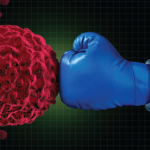Despite the use of immunomodulatory treatments, approximately half of patients had active inflammatory arthritis at their most recent follow-up appointment, which occurred from one to 24 months after ICI cessation. The researchers found patients treated with combination ICI therapy, those who had a longer duration of ICI use and those with multiple other immune-mediated adverse events were more likely to have persistent arthritis.
Fortunately, immunosuppression for the treatment of ICI-induced inflammatory arthritis did not appear to affect cancer remission. To the contrary, the data suggest that the patients who develop persistent arthritis in response to ICI treatment have a more durable cancer remission than do patients who experience transient inflammatory arthritis in response to ICI treatment.
Lara C. Pullen, PhD, is a medical writer based in the Chicago area.
Reference
- Braaten TJ, Brahmer JR, Forde PM, et al. Immune checkpoint inhibitor-induced inflammatory arthritis persists after immunotherapy cessation. Ann Rheum Dis. 2020 Mar;79(3):332–338.



